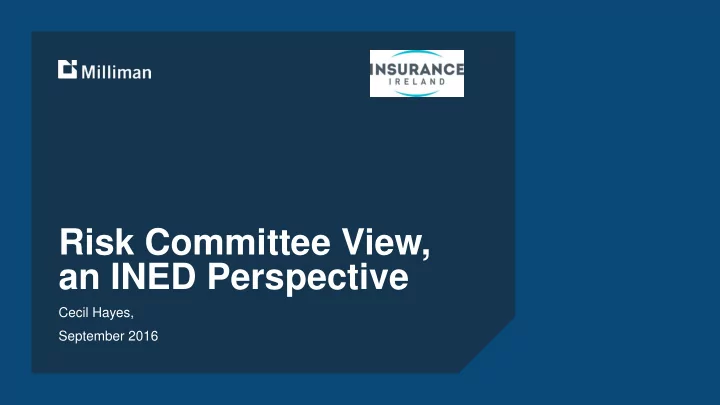

Risk Committee View, an INED Perspective Cecil Hayes, September 2016
Agenda Introduction Challenges of INED in today’s Financial Services environment Context for what INEDS need from Governance Functions Importance of Risk in “keeping us safe” What does the Risk Committee require of the CRO? Discussion
“Responsibilities of Directors in Ireland” 2011 research Deloitte A director is not an expert, and need only display skills reasonably expected from a person of his experience. He is not liable for mere errors of judgement. In essence this principle means that the duty of skill varies with the individual director. A director need not devote his continuous attention to the business. A director is entitled, in the absence of suspicious circumstances, to trust company officials to perform their duties honestly, where those duties can be properly left to them. Institute of Directors in Ireland: “ Key things that a director must do ” : Act in the best interest of the success of the company. Act honestly, diligently, keep good records of how the company is directed and controlled. Take good advice. Keep knowledge up-to-date. Show leadership and discharge directors’ duties. Disclose conflicts of interest. Ensure a culture of good communication. Make sound judgements. Attend board meetings.
Challenges of board members in today’s Financial Services CBI regulation makes responsibilities more onerous. Reaction to a “Flawed” view of crisis mitigation by INEDs. Fixation on “Robust Challenge”, but INEDs have a “supportive of management” responsibility as well. CBI have focused on the detail but what about the big picture Increased expectations of INEDs knowledge of the detail and needing to attest to same!! INED detailed engagement raises questions on “independence”. INEDs need to work through management, not manage.
Challenges of board members in today’s Financial Services Consequently FS INEDs Duties are; A moving target. Expectations increasing. Open to ongoing regulatory assessment. Personal liability. Reputational damage. Regulatory censure. Reliance on “Experts” Centro Case Directors breached their duty through failure to notice an omission that had escaped the attention of both management and the auditors. Do directors have to be accounting standard gurus? How do directors spot the ticking bomb buried deep in a massive board pack?
Context for what INEDs need from Governance Functions Non-executive directors do not have a management function in the running of the business but their legal powers and duties are identical to those of executive directors. Directors have responsibilities to ensure that the company is in compliance with all relevant legislation in addition to company law. Consider in the context of the increased expectations of non-executive directors.
Importance of CRO in “keeping us safe” Support the BRC in their oversight of risk, with particular focus on the risk appetite, risk profile and the effectiveness of the Risk management System. Give independent objective assurance on the effectiveness of the risk management activities comprising strategies, process & reporting procedures necessary to identify, measure, mange, monitor & report, on a continuous basis, the risks to which the company is exposed. Give an assessment on the risk maturity of the business and how well risk is embedded in the day to day functioning of the business. Give an independent assessment of the strategies/projects being pursued and how well they have been risk assessed and what impact on the risk appetite of the organization. Have a clear escalation process to BRC/Board Be independent but be respected and valued by the broad organisation as a key member of the SLT. Be an excellent communicator projecting confidence within the BRC that you are up to the challenge. Work with other 2 nd line/governance functions is a collaborative fashion but having your own agenda and focus.
Importance of CRO in “keeping us safe” in practice A process memorandum mapped to the BRC TofR that establishes the agenda for the year. Excellent documentation recognising the “Goldilocks” challenge, too little or too much, identifying focus/relevance and guarding against the “ ticking bomb” buried deep in a massive board pack. Joining the dots using all the data points to provide more insights, not just looking at thresholds / tolerance but also trends, emerging issues etc. Be fluent on the regulatory requirements on the BRC TofR and ensure a robust process that ensures we remain compliant. Take a lead role in the ORSA process guiding Directors as to their engagement and implementing a process that ensure education, input, challenge, and a robust record. Ensure clear lines of responsibility between all the contributors and a firm “handshake” to avoid the white space/cracks. Work closely and early with the HOAF to ensure a smooth process and no back end surprises.
Questions
Thank you Cecil Hayes
Recommend
More recommend